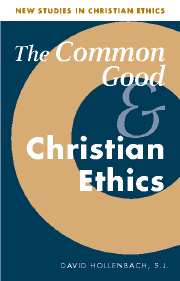5 - Christianity in a community of freedom
Published online by Cambridge University Press: 05 June 2012
Summary
Religious communities have the capacity to contribute to the common good of a free republic. This chapter will explore how this potentiality can be actualized. Specifically, it will address the question of how pursuit of the common good in a pluralistic context should be an integral part of a Christian religious self-understanding. It will explore why Christians should be actively engaged in building up a community of freedom along with those who are not Christian. A Christian religious understanding of the full human good is not only compatible with commitment to the civic good of a free society but calls Christians to civic engagement that builds solidarity in freedom. One does not have to choose between promotion of a strong understanding of the civic good and full commitment to Christian faith. The two are essentially related.
The proposal that Christianity can make genuine contributions to the common good of a free society makes significant demands on both Christians and non-Christians. It cannot be otherwise, for placing conditions only on Christians or only on non-Christians will not lead to a community of mutual freedom and solidarity. The possibility of achieving such a community is a high-stakes affair in the public life of both nation-states and the world as a whole. Past and present religious conflicts provide ample evidence of just how high. Exploring the public role of Christianity from both secular and theological perspectives, therefore, is essential to revitalizing the pursuit of the common good.
- Type
- Chapter
- Information
- The Common Good and Christian Ethics , pp. 113 - 136Publisher: Cambridge University PressPrint publication year: 2002

